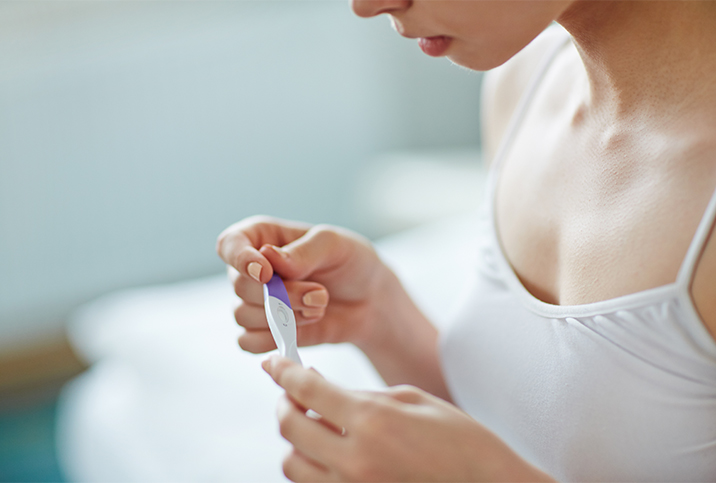The Right Time to Take a Pregnancy Test

Setting aside the cost of eight to 15 bucks, what downsides are there—if any—to a little prenatal over-enthusiasm for taking a pregnancy test? From how long to wait to what time of day is best to what can cause a false positive, here's what you need to know.
"It is never too early to take a pregnancy test, in my opinion, especially since many women do not know that they are pregnant early in the course of their pregnancy, and outcomes are much better for fetal and maternal health if they do," said Brynna Connor, M.D., a family medicine physician in Austin, Texas and healthcare ambassador at NorthWestPharmacy.com.
"However, for more accurate results on a home pregnancy test [using urine], it's a good idea to wait about 10 days after sex to take a home urine pregnancy test," Connor advised.
"It's too early to take urine pregnancy tests less than one week after missing your period," cautioned Daisy A. Ayim, M.D., a triple-board-certified cosmetic surgeon and OB-GYN in Houston.
"There's a difference in time period to check for pregnancy by urine or blood," Ayim continued. "Blood [serum] pregnancy tests can detect pregnancy as early as seven days after conception. However, [a] urine pregnancy test detects pregnancy after seven days of [a] missed cycle."
What pregnancy tests measure
An important factor to keep in mind is the time required for fertilization. This ranges from minutes to a week. After fertilization occurs, the fertilized egg needs three to four days to nestle into the uterine lining, and then hormone production begins.
Human chorionic gonadotropin (hCG), the pregnancy hormone, is the major player in pregnancy detection. Pregnancy tests detect this hormone, which is why waiting to take a test until hormone production has begun makes a difference. You may not get an accurate result if you take a test before enough hCG is present.
Non-pregnant women possess low levels of hCG, but its production spikes when you are pregnant. While the rates of increase vary, the hormone can triple in a single day, which is a solid argument for waiting a day or so before retesting.
"Urine takes longer than blood to determine a reliable positive pregnancy test result," Connor explained. "Blood can pick up hCG…earlier in pregnancy than urine tests can. Blood tests can likely pick up pregnancy hormones six to eight days after ovulation."
Why testing in the morning matters
The number of days to wait until you take a pregnancy test isn't the only factor to keep in mind. You should also consider the time of day.
"If the urine is too diluted, one can get a false-negative pregnancy test result," Connor said. "Always try to use urine from the first time you use the restroom in the morning for the most reliable results."
What can cause a false positive?
Certain circumstances may cause a pregnancy test to be positive even though you are not pregnant, known as a false positive.
"Several factors that could cause a false positive on a pregnancy test [are] ectopic pregnancy, [when] the embryo fails to implant in the uterus at all. Recent miscarriage or elective abortion can cause a person to still have elevated levels of pregnancy hormone that registers as a false positive on a pregnancy test," Connor explained. "Fertility medications such as Pregnyl that contain hCG can cause a false-positive result." Connor also listed hydroxychloroquine injections, chemotherapy and urinary tract infections (UTIs) as possible false-positive culprits.
If you recently navigated the pain of a miscarriage, it may be best to wait before taking a pregnancy test. The body can take anywhere from a few days to several weeks to return to prepregnancy levels of hCG, depending on how far along the pregnancy was when it ended.
Evaporation lines on the pregnancy test also contribute to false positives. An evaporation line is a trick of the eye: When a faint, colorless or gray line appears within the testing window, it can be easy to assume you're seeing a result that isn't actually occurring. These lines appear if the test gets wet or is left out longer than advised.
A faint positive result may appear similar to an evaporation line, except this line should be lightly colored. This is another reason to test first thing in the morning; diluted urine won't reflect your hormone levels as accurately. Evaporation lines and faint positives are best resolved by retesting a day or two later because the pregnancy hormones will have significantly increased in that time if you are pregnant.
Retesting is the most effective route for accurate results with at-home tests. In the case of a potential false positive or false negative, a visit to your OB-GYN can provide a definitive answer.


















